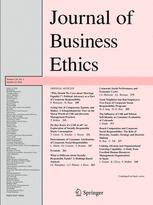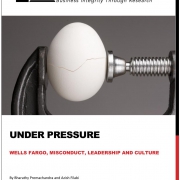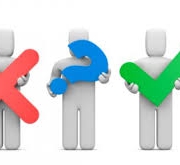Developing Ethical Behavior in Financial Institutions
 Guest post by Rachel Fichter of S&P Global Ratings and member of our Advisory Board
Guest post by Rachel Fichter of S&P Global Ratings and member of our Advisory Board
Late last year I published a post on LinkedIn about my dissertation research on developing ethical behavior in financial institutions. I was disheartened, but not surprised, by comments such as “a losing battle” and “oxymoron,” which promulgated a deeply cynical view of ethics in the financial sector. Fast forward to the announcement last week that Wells Fargo will pay a fine of $185 million (a mere drop in the bucked for a company that generated $23 billion in profits in 2015) to settle allegations of fraud committed by thousands of its employees. It is particularly disconcerting that unethical behavior could take place on such a massive scale after years of intense post-financial crisis scrutiny and regulation.
In spite of continued ethical breaches in the financial industry, as a “scholar-practitioner” in the field of adult learning, I am firm believer in the possibility of positive human growth and transformation. And, as a 17-year veteran of the financial industry, I have had the privilege of collaborating with many outstanding people who are fully committed to “doing the right thing”—helping clients achieve their long term financial goals and to supporting the development of vibrant economies in the communities they serve. Unfortunately, I have also worked with self-serving and even mean-spirited individuals whose behaviors were, in my view, unethical. Although many of them imploded over time, it was not before creating a trail of lasting devastation.
In my recently published article in the Journal of Business Ethics, “Doing the right thing: Developing ethical behavior in financial institutions,” I combined a review of ethical decision making models with key concepts from organization and adult learning theories to infuse unique and fresh insights into the topic of ethical decision making. Much of the existing literature focuses on the role of leadership in creating an ethical culture and the alignment of processes and systems (such as performance management and compensation). While undoubtedly important, these approaches neglect to consider how employees actually learn behavior (both ethical and unethical) in an organizational context.
Industry officials, such as Federal Reserve Board Governor Daniel K. Tarullo, understand that employees need to make decisions “in a manner consistent with a broader set of considerations” (Tarullo, 2014, p. 5). Likewise, the Group of Thirty (2015), rightfully emphasizes the importance of “achieving consistent behavior and conduct aligned with firm values, as key to strategic success” (Group of Thirty 2015, p. 46). Unfortunately, this kind of behavioral change is incredibly difficult to effectuate. Organization theory explains that behavior is the manifestation of deeply held organizational assumptions, which are often at odds with the formal, or espoused, values of an organization. Worse yet, defensive organizational routines actually reinforce and perpetuate misalignment. Informal learning theory says that employees learn mostly on the job, which means that they absorb the assumptions and the defensive routines simply by interacting with their colleagues at work. Transformative learning theory, in turn, tells us that reflection and discourse are necessary to surface and challenge those assumptions and break the habit of defensive routines.
In conjunction with ethical decision making models, insights from organization and adult learning theory translate into concrete methods for developing ethical behavior. In the case of Wells Fargo, it is no surprise that the news prompted Tarullo to comment that “banks’ cultures haven’t changed enough” (Glazer, 2016). Perhaps there is an opportunity for Wells Fargo to test out the recommendations outlined in my article, which would, at a minimum, be a powerful sign of serious intentions by its leaders to lay the foundation for a truly ethical culture.
References
- Glazer, E. (2016). Next test for Wells Fargo: Its reputation.
- Group of Thirty. (2015). Banking conduct and culture: A call for sustained and comprehensive reform. Washington, DC: Author.
- Tarullo, D. K. (2014). Good compliance, not mere compliance: A speech at the Federal Reserve Bank of New York Conference, “Reforming Culture and Behavior in the Financial Services Industry,” New York, NY, October 20, 2014 (Speech No. 823). Board of Governors of the Federal Reserve System (U.S.).






